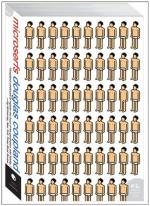|
This section contains 1,072 words (approx. 4 pages at 300 words per page) |

|
SOURCE: “Get a (Digital) Life,” in New Statesman and Society, Vol. 8, No. 378, November 10, 1995, p. 37.
In the following review, Jukes compares a journalistic account of the computer software profession with Coupland's Microserfs and assesses the novelist's depiction of cyberculture.
The digital revolution has brought its prophets and mystics—the breathless theorising of Wired, or William Gibson's disembodied cyberspace—but what it has so far lacked is a sober, wry realism. It is as though the Late Gothic Age were to be remembered solely through Aquinas' theology or the visions of Dante, without a Chaucer or a Rabelais to chronicle the carnal irreverence of everyday life.
Douglas Coupland has taken us a step closer with his new book Microserfs—perhaps the first great work of cyberrealism. Where others are obsessed by pixels and bits, Coupland's subject is the “biomass” squeezed between the silicon, the “carbon-based forms” that still sweat, flake...
|
This section contains 1,072 words (approx. 4 pages at 300 words per page) |

|


